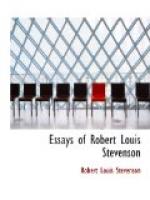[Note 30: Valhalla. In Scandinavian mythology, this was the heaven for the brave who fell in battle. Here they had an eternity of fighting and drinking.]
[Note 31: Meticulous. Timid. From the Latin, meticulosus.]
[Note 32: Kindly. Here used in the old sense of “natural.” Compare the Litany, “the kindly fruits of the earth.”]
[Note 33: “The real long-lived things.” For Whitman, see our Note 12 of Chapter III above.]
[Note 34: Robert Hunter, Sheriff of Dumbarton. Hunter recognised the genius in Stevenson long before the latter became known to the world, and gave him much friendly encouragement. Dumbarton is a town about 16 miles north-west of Glasgow, in Scotland. It contains a castle famous in history and in literature.]
[Note 35: A novel by Miss Mather. The name should be “Mathers.” Helen Mathers (Mrs. Henry Reeves), born in 1853, has written a long series of novels, of which My Lady Greensleeves, The Sin of Hagar and Venus Victrix are perhaps as well-known as they deserve to be.]
[Note 36: Chelsea. Formerly a suburb, now a part of London, to the S.W. It is famous for its literary associations. Swift, Thomas Carlyle, Leigh Hunt, George Eliot, Dante Gabriel Rossetti and many other distinguished writers lived in Chelsea at various times. It contains a great hospital, to which Stevenson seems to refer here.]
[Note 37: Webster, Jeremy Taylor, Burke. John Webster was one of the Elizabethan dramatists, who, in felicity of diction, approached more nearly to Shakspere than most of his contemporaries. His greatest play was The Duchess of Malfi (acted in 1616). Jeremy Taylor (1613-1667), often called the “Shakspere of Divines,” was one of the greatest pulpit orators in English history. His most famous work, still a classic, is Holy Living and Holy Dying (1650-1). Edmund Burke (1729-1797) the parliamentary orator and author of the Sublime and Beautiful (1756), whose speeches on America are only too familiar to American schoolboys.]
[Note 38: Junius. No one knows yet who “Junius” was. In the Public Advertiser from 21 Jan. 1769 to 21 Jan. 1772, appeared letters signed by this name, which made a sensation. The identity of the author was a favorite matter for dispute during many years.]
[Note 39: David Hume. The great Scotch skeptic and philosopher (1711-1776).]
[Note 40: Shakespeare’s fairy pieces with great scenic display. So far from this being a novelty to-day, it has become rather nauseating, and there are evidences of a reaction in favour of hearing Shakspere on the stage rather than seeing him.]




